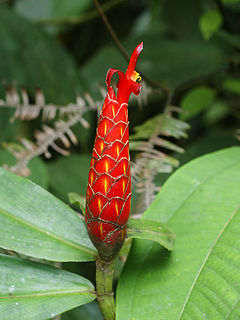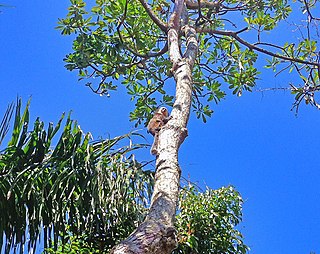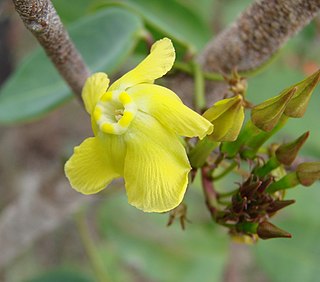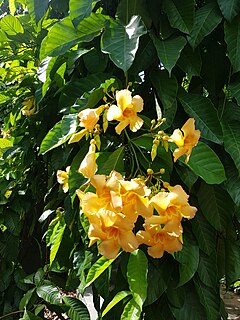
Dieffenbachia is a genus of tropical flowering plants in the family Araceae. It is native to the New World Tropics from Mexico and the West Indies south to Argentina. Some species are widely cultivated as ornamental plants, especially as houseplants, and have become naturalized on a few tropical islands.

Zamia is a genus of cycad of the family Zamiaceae, native to Mexico, the West Indies, and Central and South America as far south as Bolivia. The range of one species (Z. integrifolia, extends into the contiguous United States, i.e. Georgia and Florida.

Rauvolfia is a genus of evergreen trees and shrubs, commonly known as devil peppers, in the family Apocynaceae. The genus is named to honor Leonhard Rauwolf. The genus can mainly be found in tropical regions of Africa, Asia, Latin America, and various oceanic islands.

Costus is a group of perennial herbaceous plants in the family (Costaceae) described by Linnaeus as a genus in 1753. It was formerly known as Hellenia after the Finnish botanist Carl Niclas von Hellens. It is widespread through tropical and subtropical regions of Asia, Africa, and the Americas.

Vriesea is a genus of flowering plants in the botanical family Bromeliaceae, subfamily Tillandsioideae. The genus name is for Willem Hendrik de Vriese, Dutch botanist, physician (1806–1862). Its species are widespread over Mexico, Central America, South America and the West Indies.

Himatanthus is a genus of flowering plant in the family Apocynaceae, first described as a genus in 1819. It is native to Panama and South America.
- Himatanthus articulatus(Vahl) Woodson - widespread from Panama east to French Guiana and south to Bolivia
- Himatanthus attenuatus(Benth.) Woodson - Venezuela, Colombia, N Brazil
- Himatanthus bracteatus(A.DC.) Woodson - Venezuela, Colombia, Guianas, Brazil, Peru, Ecuador
- Himatanthus drasticus(Mart.) Plumel - Guianas, Brazil
- Himatanthus lancifolius(Müll.Arg.) Woodson
- Himatanthus obovatus(Müll.Arg.) Woodson - Brazil, Bolivia, Guyana
- Himatanthus phagedaenicus(Mart.) Woodson - S Venezuela, NW Brazil
- Himatanthus semilunatusMarkgr. - Amazon Basin
- Himatanthus stenophyllusPlumel - Colombia, NW Brazil, Guyana, Suriname
- Himatanthus tarapotensis(K.Schum. ex Markgr.) Plumel - Colombia, Bolivia, Brazil, Peru, Ecuador

Pitcairnia is a genus of plants in the family Bromeliaceae, subfamily Pitcairnioideae. It was named for Dr. William Pitcairn, Scottish physician and gardener (1711–1791). The genus Pitcairnia ranks as the second most prolific of the bromeliad family. They are most abundant in Colombia, Peru and Brazil, but can also be found in areas from Cuba and Mexico south to Argentina. One species, Pitcairnia feliciana is found in tropical West Africa and is the only member of the family Bromeliaceae not native to the Americas.

Desmoncus is a genus of mostly climbing, spiny palms native to the Neotropics. The genus extends from Mexico in the north to Brazil and Bolivia in the south, with two species present in the southeastern Caribbean.

Prestoea is a genus of palms native to the Caribbean, Central and South America. Its range extends from Nicaragua and the Greater Antilles in the north to Brazil and Bolivia in the south.
Forsteronia is a genus of plants in the family Apocynaceae, first described as a genus in 1818. It is native to South America, Central America, Mexico, and the West Indies.
Malouetia is a genus of plants in the family Apocynaceae, first described as a genus in 1844. It is native to Africa, South America, Central America, and the West Indies.

Renealmia is a plant genus in the family Zingiberaceae. Its members are native to tropical Africa and tropical America.

Prestonia is a genus of plants in the family Apocynaceae, first described as a genus in 1810. It is native to Mexico, Central America, South America, and the West Indies. It is closely related to Artia and Parsonsia.
Crossoglossa is a genus of flowering plants from the orchid family, Orchidaceae. It contains 26 currently recognized species native to Central America and South America, from Nicaragua to Bolivia.
- Crossoglossa acuminatissimaNog.-Sav. & Carnevali - Colombia
- Crossoglossa aurantilineataPupulin - Costa Rica
- Crossoglossa barfodiiDodson - Ecuador
- Crossoglossa bifidaDressler - Panama
- Crossoglossa blephariglottis(Schltr.) Dressler ex Dodson - Panama, Costa Rica
- Crossoglossa boyleiDodson - Ecuador
- Crossoglossa caulescens(Lindl.) Dodson - Ecuador
- Crossoglossa dalessandroi(Dodson) Dodson - Ecuador
- Crossoglossa dalstroemii(Dodson) Dodson - Ecuador
- Crossoglossa dodsoniiR.Vásquez - Bolivia
- Crossoglossa ellipticaDressler - Panama
- Crossoglossa eustachys(Schltr.) Dressler ex Dodson - Panama, Costa Rica
- Crossoglossa exigua(Garay) Nog.-Sav. & G.A.Romero - Colombia
- Crossoglossa fratrum(Schltr.) Dressler ex Dodson - Panama, Costa Rica, Nicaragua
- Crossoglossa hirtziiDodson - Ecuador
- Crossoglossa kalbreyeriana(Kraenzl.) P.Ortiz - Colombia
- Crossoglossa liparidoides(Finet) Dodson - Ecuador, Peru
- Crossoglossa longissima(Kraenzl.) P.Ortiz - Colombia
- Crossoglossa nanegalensisDodson - Ecuador
- Crossoglossa neirynckianaSzlach. & Marg. - Ecuador
- Crossoglossa pichinchae(Schltr.) Dodson - Ecuador
- Crossoglossa polyblephara(Schltr.) Dodson - Colombia
- Crossoglossa sotoanaPupulin & Karremans - Costa Rica
- Crossoglossa steinii(Dodson) Dodson - Ecuador
- Crossoglossa tipuloides(Lindl.) Dodson - Colombia
- Crossoglossa topoensis(Mansf.) Dodson - Ecuador

Pterichis is a genus of flowering plants from the orchid family, Orchidaceae. It is native to South America, Central America and Jamaica.

Lacmellea is a genus of flowering plants in the family Apocynaceae first described as a genus in 1857. It is native to South America and Central America.
- Lacmellea abbreviataJ.F.Morales - Colombia
- Lacmellea aculeata(Ducke) Monach - Peru, NW Brazil, the Guianas
- Lacmellea arborescens(Müll.Arg.) Markgr. - Brazil, Bolivia
- Lacmellea bahiensisJ.F.Morales - Bahia
- Lacmellea costanensisSteyerm. - N Venezuela
- Lacmellea densifoliata(Ducke) Markgr. - Pará
- Lacmellea edulisH.Karst. - Panama, Venezuela, Colombia, Ecuador, Peru, Brazil
- Lacmellea floribunda(Poepp.) Benth. & Hook.f. - Peru, NW Brazil, Suriname, French Guiana
- Lacmellea foxii(Stapf) Markgr. - Peru
- Lacmellea gracilis(Müll.Arg.) Markgr. - N Peru, NW Brazil
- Lacmellea guyanensis(Müll.Arg.) Monach - French Guiana
- Lacmellea klugiiMonach. - Peru
- Lacmellea macranthaJ.F.Morales - Ecuador
- Lacmellea microcarpa(Müll.Arg.) Markgr. - Colombia, S Venezuela, NW Brazil
- Lacmellea oblongataMarkgr. - SE Colombia, Ecuador, Peru
- Lacmellea panamensis(Woodson) Markgr. - Costa Rica, Panama, Colombia, Ecuador
- Lacmellea pauciflora(Kuhlm.) Markgr. - Brazil
- Lacmellea peruviana(Van Heurck & Müll.Arg.) Markgr. - Peru
- Lacmellea pygmaeaMonach. - Amazonas State in Venezuela
- Lacmellea ramosissima(Müll.Arg.) Markgr. - Colombia, S Venezuela, NW Brazil
- Lacmellea speciosaWoodson - Costa Rica, Panama, Colombia, Ecuador, Peru
- Lacmellea standleyi(Woodson) Monach. - Belize, Guatemala, Honduras
- Lacmellea utilis(Arn.) Markgr. - S Venezuela, Guyana
- Lacmellea zamoraeJ.F.Morales - Costa Rica
Macoubea is a genus of plant in the family Apocynaceae first described as a genus in 1775. It is native to South America and Central America.
Macropharynx is a genus of plants in the family Apocynaceae, first described as a genus in 1927. It is native to South America and Central America.

Odontadenia is a genus of plant in the family Apocynaceae, first described as a genus in 1841. It is native to southern Mexico, Central America, South America, and the West Indies.
- Odontadenia anomala(Van Heurck & Müll.Arg.) J.F.Macbr. - Peru, Bolivia
- Odontadenia campanulataJ.F.Morales - Colombia
- Odontadenia funigeraWoodson - Venezuela, Colombia, Ecuador, Peru, Brazil
- Odontadenia geminata(Hoffmanns. ex Roem. & Schult.) Müll.Arg. - 3 Guianas, Venezuela, Colombia, Ecuador, Peru, Bolivia, N Brazil
- Odontadenia glaucaWoodson - Amazonas State in S Venezuela
- Odontadenia gracilipes(Stadelm.) Woodson - Minas Gerais
- Odontadenia hypoglauca(Stadelm.) Müll.Arg. - Bolivia, Brazil
- Odontadenia killipiiWoodson - French Guiana, Venezuela, Colombia, Ecuador, Peru, N Brazil
- Odontadenia kochiiPilg. - Guyana, Venezuela, Colombia, Ecuador, Peru, N Brazil
- Odontadenia laxiflora(Rusby) Woodson - Peru, Bolivia, N Brazil
- Odontadenia lutea(Vell.) Markgr. - Peru, Bolivia, Brazil
- Odontadenia macrantha(Roem. & Schult.) Markgr. - Oaxaca, Chiapas, Central America, Trinidad & Tobago, 3 Guianas, Venezuela, Colombia, Ecuador, Peru, Brazil
- Odontadenia markgrafianaJ.F.Morales - French Guiana, N Brazil
- Odontadenia matogrossanaJ.F.Morales - Goiás, Mato Grosso
- Odontadenia nitida(Vahl) Müll.Arg. - Trinidad & Tobago, 3 Guianas, Venezuela, Colombia, Ecuador, Peru, Brazil, Bolivia
- Odontadenia perrottetii(A.DC.) Woodson - Venezuela, Colombia, Brazil, Bolivia, Guyana, French Guiana
- Odontadenia polyneura(Urb.) Woodson - Hispaniola
- Odontadenia puncticulosa(Rich.) Pulle - Central America, 3 Guianas, Venezuela, Colombia, Ecuador, Peru, Brazil, Bolivia
- Odontadenia stemmadeniifoliaWoodson - Venezuela, Colombia, Ecuador, Peru, Brazil
- Odontadenia verrucosa(Willd. ex Roem. & Schult.) K.Schum. ex Markgr. - 3 Guianas, Venezuela, Colombia, Ecuador, Peru, Brazil, Bolivia, Panama, Costa Rica, Nicaragua
- Odontadenia cuspidataRusby = Mandevilla cuspidata(Rusby) Woodson
- Odontadenia duckeiMarkgr. = Mandevilla pohliana(Stadelm.) A.H.Gentry
- Odontadenia glandulosa(Ruiz & Pav.) K.Schum. = Mandevilla glandulosa(Ruiz & Pav.) Woodson
- Odontadenia macrocalyx(Müll.Arg.) Miers = Tabernaemontana macrocalyxMüll.Arg.
Peltastes is a genus of flowering plants in the family Apocynaceae, first described as a genus in 1932. It is native to Central and South America.













